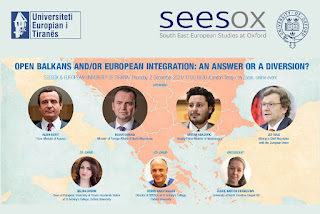On 2 December 2021 SEESOX in cooperation with The European University of Tirana hosted an online panel discussion on the European and regional state of play of the Western Balkan countries entitled: “Open Balkans and/or European integration: An answer or a diversion?” Speakers included Albin Kurti, Prime Minister of Kosovo, Dritan Abazovic, Deputy Prime Minister of Montenegro, Zef Mazi, Albania’s Chief Negotiator to EU, and with Jessie Barton Hronesova, University of North Carolina-Chapel Hill, as a discussant. Othon Anastasakis, Director of SEESOX and Belina Budini, Dean of Faculty of Humanities, Education and Liberal Arts at European University of Tirana, co-chaired the event.
In his introduction Othon Anastasakis pointed out that the Open Balkans Initiative, like many other initiatives in the past, is based on ambitious principles of open borders, labor mobility and integrated regional market. But as many things in the region, it has also generated criticism and the mere fact that some countries are in and some countries not, is a testimony of the ambivalence of the project; some see it as an asset, while others as a liability and in competition with the European integration process.
Belina Budini, in her introduction of the topic pointed out that the Open Balkan Initiative, aiming at the creation of an open regional market, and signed by Albania, North Macedonia and Serbia, unavoidably raises the issue of compatibility with the European integration of the Western Balkan countries and their accession to the EU. Even though the project is represented as a call for action in response to the delay in obtaining EU membership, it has also attracted criticism on the grounds that it makes the region more vulnerable.
Prime Minister of Kosovo, Albin Kurti argued that as regards regional cooperation the Western Balkan countries have a lot to gain by removing barriers to trade and travel, work and business, but they should also be cautious. On that, he pointed out that any regional initiative must be within the EU agenda and EU rules, and bring the aspiring countries closer to EU membership. Mr Kurti emphasized that Kosovo regards the Berlin Process as the only inclusive umbrella framework under which there are other projects including that of the Common Regional Market. He declared that his country would continue to support the Berlin Process as a platform where all WB countries are equally represented and as a complementary process to the EU integration. In this direction, he had proposed a new framework for regional cooperation, called Southeast European Free Trade Agreement (SEFTA) which intends to strengthen the common regional market by removing obstacles which impede progress and by introducing independent institutions which can impartially and professionally solve disputes among partners. In that spirit, he stated that Kosovo does not support other initiatives outside the Berlin Process, the Western Balkans Common Regional Market and the EU agenda; the EU, PM Kurti ended, is the most important political project of peace and prosperity, and the most distinguished historical process since Second World War.
Deputy Prime Minister of Montenegro, Dritan Abazovic argued that Montenegro, like other Balkan states, faced several challenges, including corruption, state capture or problems with the rule of law and emphasized the need for democratic politics. On the Open Balkan he argued that Montenegro’s goal is to join the EU and that they are not looking for a substitute to it. However, he also mentioned that the Open Balkan initiative doesn’t have any intention to antagonize the goal of integration, and could be good if we consider the benefits related to the mobility of the people and business. Mr. Abazovic also pointed out that the more restricted the borders are, the more cross-border corruption exists, and concluded by appealing to stop being afraid of each other in the region and to aim at cooperation as the only way to go forward against the drawbacks of nationalism, polarization and democratic backsliding.
Albania’s Chief Negotiator to the European Union, Zef Mazi, started by saying that the title of the panel implies a black and white approach, in favor or against the Open Balkan, whereas in his opinion this should not be a binary issue. The top strategic priority for Albania is the EU accession where Mr Mazi pointed to the judiciary reform progress of his country as a record against corruption and organized crime, and mentioned how Albania has been a reliable partner of the EU, in line with the EU foreign policy. He ended by laying his hopes that by the end of the year, there would be good news on the accession path and he was cautiously optimistic about the prospects.
Discussant Jessie Hronesova highlighted some pros and cons of the Open Balkan initiative, starting with some benefits that this project can potentially bring to the region. First in economic terms, the WB-6 economies a region of nearly 18 million people, is comprised by extremely small markets, the GDP of which is jointly the size of the three Baltic countries, or Slovakia. Anything that creates open borders, and facilitates the flow of capital and people is good for the region. On the other hand, Jessie Barton Hronesova listed a number of potentially problematic aspects of the initiative, including duplication of existing efforts through the Berlin Process, dubious motivation for its launch that potentially covers bigger political issues, the problematic leadership of Serbia given the regional fear of its domination, and the lack of any fine-print detail about how to implement open borders in a situation of continued non-recognition of Kosovo by Serbia and Bosnia and Herzegovina, among other issues. However, she concluded that any regional initiative is worth exploring and that abstention has rarely been productive in making progress.
This event was in cooperation with the European University in Tirana.
Belina Budini (European University in Tirana and St Antony's College, Oxford)


No comments:
Post a Comment
Note: only a member of this blog may post a comment.